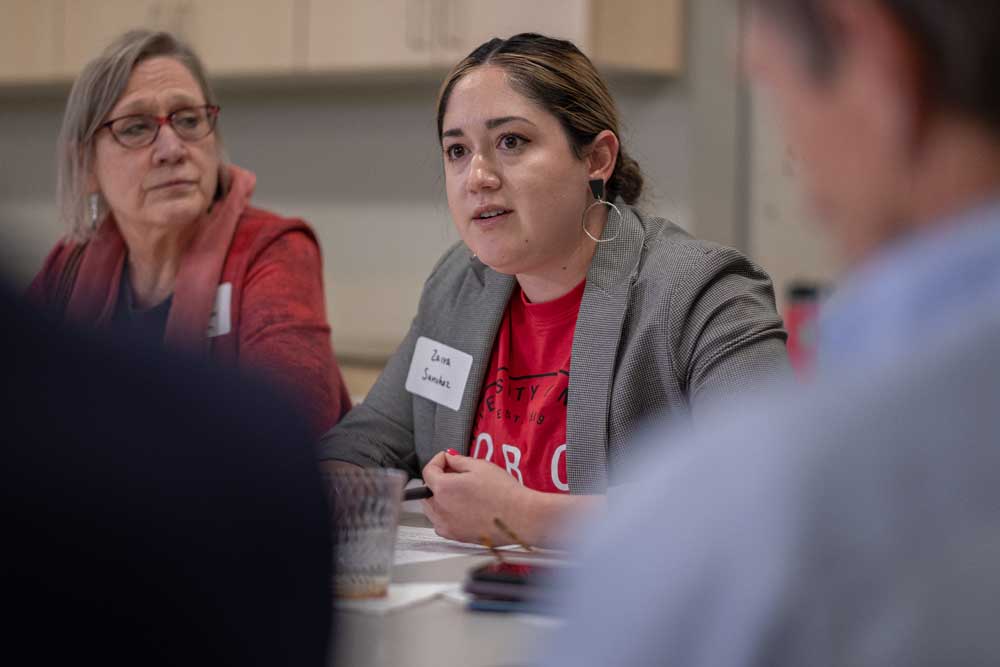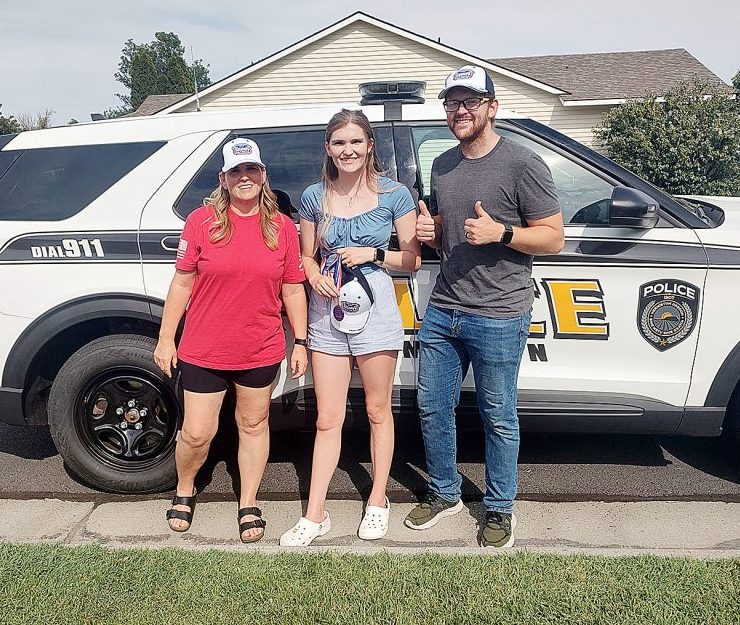Nonprofit leader calls LUBGWMA ‘sacrifice zone’ during Senate meeting
Published 7:00 pm Thursday, May 15, 2025

- Zaira Sanchez, director of community organizing for Oregon Rural Action, discusses how the community feels a lack of follow-through on the part of the state at a roundtable meeting on groundwater contamination April 24, 2024, with Gov. Tina Kotek at Blue Mountain Community College in Boardman. Sanchez reiterated similar concerns at a May 13, 2025, Senate informational hearing. (Yasser Marte/East Oregonian, File)
State, commissioner offer different opinions on proposed bill
SALEM — Going against what state agency representatives and local leaders said, Oregon Rural Action’s Kaleb Lay, director of policy and research, said he’s concerned about the progress in northern Morrow and western Umatilla counties regarding well use and drinking water intervention.
Living in the Lower Umatilla Groundwater Management Area means people using wells for drinking water are at risk of having nitrate contamination at levels above what is safe to consume.
Lay was one of 16 people — including local leaders as well as state agency representatives — who offered testimony Tuesday afternoon, May 13, to the Oregon Senate Committee on Natural Resources and Wildfire during an informational meeting to hear about the LUBGWMA.
Trending
“It’s important to remember that in a sacrifice zone, public health (and) state policy are pushed to the back while industrial growth (and) economic output are made the focus,” Lay said. “That is exactly what has happened in the Lower Umatilla Basin.”
Sen. Jeff Golden, D-Ashland, chairs the committee that hosted the meeting. He said the goal of the meeting was to “ see if we can develop over time … something like a plan or some action steps for going forward” with regard to the groundwater management area.
Lay’s colleague, Zaira Sanchez, said the state hasn’t historically listened to residents, despite knowing about the danger of nitrates, which has caused trust issues within the community.
“The bottom line is that community voices must be centered,” Sanchez said. “Our interests and expertise will help find the solutions we need to improve the conditions we’re currently in.”
A goal of working together
Representatives from Oregon’s departments of Environmental Quality, Agriculture and Water Resources and the Oregon Health Authority spoke as well, as did a staff member from Gov. Tina Kotek’s office.
Also offering testimony were people from organizations including Water for Eastern Oregon, Oregon Environmental Council, the Northeast Oregon Water Association, the Port of Morrow, and Umatilla and Morrow counties.
Trending
While Lay and Sanchez with Oregon Rural Action emphasized the negative effects that nitrates have had on the community, state agency staff highlighted efforts the past few years to address the problems — drinking water issues and scientific or regulatory challenges — in the LUBGWMA.
“It will take continued effort and resources over decades to a significant reduction in nitrate in this area,” said Laura Gleim with the Oregon Department of Environmental Quality. “The good news is that the programs we’re putting in place now will move us towards clean water in the future, and that’s what is in the nitrate reduction plan.”
Dan Dorran, Umatilla County commissioner, said despite there being “no consistency in information, no interaction between the agencies,” the governor has pushed state agencies to collaborate. He said he believes consistent data is required before anything else can happen, but “we are headed in the right direction with the agencies right now.”
Morrow County Planning Director Tamra Mabbott said the counties are working hard on solutions to reduce drinking water or get people access to clean drinking water that’s not bottled. But, she said, they need better public engagement and funding.
Karen Lewotsky, water program director for the nonprofit Oregon Environmental Council, said her main takeaways from 15 years of work in the LUBGWMA are, first, that agency involvement has been sporadic and underfunded, so the state needs to fund and then hold agencies accountable for achieving set goals.
Second, relationships are vital to the success of solutions, and local stakeholders need to work together rather than “demonizing one group or one individual.” Third, she said, paying close attention to the local data and responding to it is necessary. Finally, she said, state agencies need to “acknowledge their past missteps” to move forward with the affected communities’ trust and support.
“My real hope is that as a state, we can learn from the LUBGWMA experience,” Lewotsky said.
Water for Eastern Oregon Executive DirectorJustin Green mentioned ideas for addressing legacy nitrates — the ones that are in the groundwater from decades ago. He suggested aquifer restoration, which would mean “pulling out the water that has elevated nitrates in it and supplying fresh water” to the aquifer to replace it. Then, the nitrate-rich water could maybe be cleaned up or used for safe application on farmland where it wouldn’t get into drinking water.
Considerations for the Senate
After everyone’s testimony, Sen. Todd Nash, vice chair of the committee and the senator representing Umatilla and Morrow counties, said it was humbling to hear about all the investment and effort from everyone.
“This is going to take a long time to clean up the aquifer,” he said. “You guys are on a good trajectory to do that.”
The state senators are considering Senate Bill 1154 this session. The bill would make changes to laws about areas with ground water quality problems. Geoff Huntington with the governor’s office said the bill would require an interagency team, which would help the state be more proactive in addressing groundwater issues.
He also said the bill is compatible with the work going on in the LUBGWMA.
“We’ve heard a lot of worry from folks that things are finally going well in the Lower Umatilla Basin, with the community, with the advisory group, with the agencies and coordination, and we don’t want to mess that up, and we won’t,” Huntington said.
However, Dorran raised concerns, alluding the bill would not prevent future problems like those facing the LUBGWMA.
“I think that (Senate Bill 1154) has aspirational goals,” he said. “I think it’s a great idea, but I also think it needs a lot of work because otherwise all we’re doing is carrying these problems forward.”
The bill left the Committee on Natural Resources and Wildfire in April and is now in the Senate Committee on Rules.









